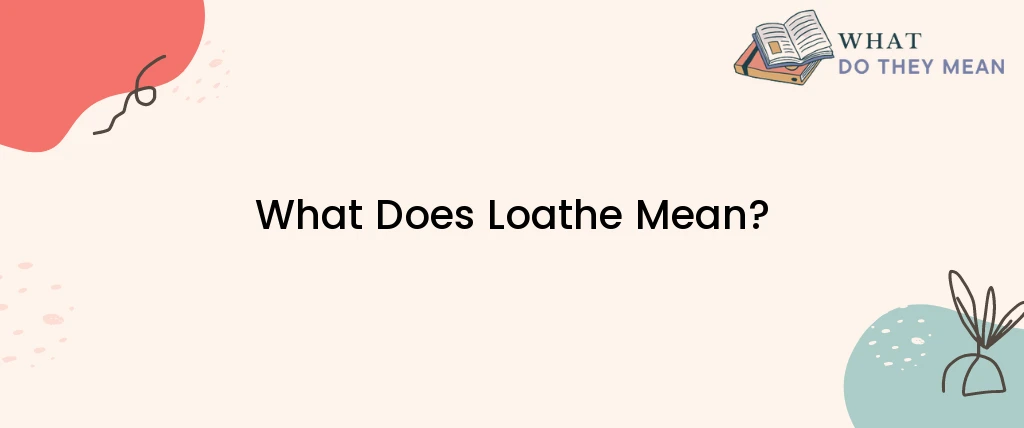The Oxford English Dictionary defines “loathe” as “feel intense dislike or disgust for”. It is a strong word that conveys a deep and visceral aversion towards the object of one’s feelings. The word “loathe” is typically used to describe a very strong negative reaction to someone or something.
Examples of Usage
Here are some examples of how “loathe” is used in everyday language:
- “I absolutely loathe sushi. I can’t stand the taste of raw fish.”
- “She loathes her boss. He’s always micro-managing and criticizing her work.”
- “He loathed going to the dentist. The sound of the drill made him feel sick.”
- “I loathe people who are always late. It shows a lack of respect for other people’s time.”
Synonyms and Antonyms
“Loathe” is a very strong word, so it’s important to choose the right synonym or antonym depending on the degree of dislike or disgust being expressed. Here are some synonyms and antonyms for “loathe”:
Synonyms:
- Abhor
- Detest
- Despise
- Dislike
- Hate
Antonyms:
- Adore
- Love
- Like
- Enjoy
- Cherish
Origins and History
The word “loathe” has its origins in the Middle English word “lothien”, which meant “to dislike or be unwilling to do something”. Over time, the word evolved to mean a more intense form of dislike or unwillingness, which is how we use it today.
Psychological Perspective
From a psychological perspective, “loathe” is a word that describes a strong emotional response to an object or person. It is often used to describe a feeling of disgust or revulsion, which can be triggered by a variety of factors. For example, someone may loathe a particular food due to a bad experience they had with it in the past, or they may loathe a particular person because of a personality trait that they find repulsive.
Cultural and Societal Significance
The use of the word “loathe” is often tied to cultural and societal norms. In some cultures, it may be considered impolite to express strong negative feelings towards someone or something, while in others, it may be seen as a sign of honesty and authenticity. In some cases, loathing may even be seen as a virtue, such as when it is directed towards something that is considered universally abhorrent, such as cruelty or injustice.
Using “Loathe” in Writing
When using the word “loathe” in writing, it’s important to choose the right context and tone. It’s a very strong word, so it’s best used when the level of dislike or disgust being expressed is appropriate. For example, if you’re writing a formal business email, you probably wouldn’t want to use the word “loathe” to express your dislike of a particular product. On the other hand, if you’re writing a scathing critique of a book or movie, using the word “loathe” might be entirely appropriate.
Conclusion
In conclusion, the verb “loathe” is a powerful word that conveys a deep and visceral aversion towards someone or something. It’s a word that is often tied to strong emotions and cultural norms, and it’s important to use it in the right context and tone. Whether you’re expressing your dislike of a particular food or a particular person, it’s important to choose the right synonym or antonym depending on the degree of dislike or disgust being expressed. By understanding the nuances of the word “loathe”, we can better communicate our feelings and opinions in a clear and effective manner.

As a researcher, I am curious and driven by the pursuit of knowledge. I approach my work with a critical eye, carefully evaluating sources and methods to ensure that my findings are accurate and reliable. Whether delving into scientific studies, historical records, or cutting-edge technologies, I am always seeking to expand my understanding and make new discoveries. I am dedicated to uncovering new insights and finding solutions to complex problems, and am driven by a passion for uncovering the truth.

